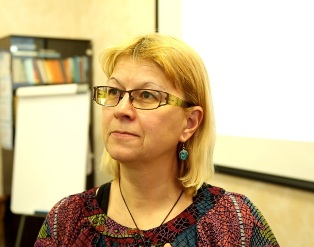Seminar of Marina L. Butovskaya on the evolutionary basis of human behaviour
 On March 2 – 6, 2015, Marina L. Butovskaya, Doctor of History, Professor at the Educational and Scientific Centre of the Russian State University for the Humanities, Head of the Sector of Cross-Cultural Psychology and Human Ethology of the Institute of Ethnology and Anthropology (Russian Academy of Sciences, Moscow) held a seminar at the Laboratory for Social and Anthropological Research.
On March 2 – 6, 2015, Marina L. Butovskaya, Doctor of History, Professor at the Educational and Scientific Centre of the Russian State University for the Humanities, Head of the Sector of Cross-Cultural Psychology and Human Ethology of the Institute of Ethnology and Anthropology (Russian Academy of Sciences, Moscow) held a seminar at the Laboratory for Social and Anthropological Research.
The focus was the ethology, a research field exploring the biological basis of human behaviour. Human ethology today is a clear-cut area of knowledge with an arsenal of quantitative methods which is based on the evolutionary theory. In Marina L. Butovskaya’s opinion, all students of the humanities have to study such a discipline as the evolutionary basis of human behaviour. Neglecting the biological dimension of human behaviour entails big troubles both in theory and practice. Behaviour bears a substantial in-born component and we simply cannot understand humans as such without taking this component into account. One can speak of the in-born basis of specific individual behaviour as well as of common characteristics for all kinds of people that have formed over millions of years of evolution. Such behavioural patterns are present and manifest themselves in every normal person. The biological basis of human behaviour and the evolutionary past also influence the formation of culture.
 Ethology can be applied in various areas. For instance, western ethologists are actively involved in the creation of a positive image of political figures. The US president team always includes one ethologist. Currently, ethology is being actively used in psychiatry in Europe and America as many diagnostic methods to identify a disease draw on ethological methods.
Ethology can be applied in various areas. For instance, western ethologists are actively involved in the creation of a positive image of political figures. The US president team always includes one ethologist. Currently, ethology is being actively used in psychiatry in Europe and America as many diagnostic methods to identify a disease draw on ethological methods.
The question of the reproductive success and choice of a sexual partner both in traditional and industrial society sparked particular interest of the student audience.
The meaningful popularization of discoveries of human ethology can be undoubtedly beneficial to the society because the comprehension of the specifics of human behaviour as a phenomenon formed in the course of millions of years of evolution in no way undermines the place of man in nature. On the contrary, this makes them part of all and reminds them of the extremely careless attitude towards the natural environment and of the need for contact between man and flora and fauna. The indication of the biological origins of human aggression goes hand in hand with the evidence of substantial evolutionary predispositions to pacifism in dealing with other humans.
Professor Butovskaya’s field research in Africa triggered a lot of questions from the audience. She shared her experience of dealing with hunter gatherers hatza in Tanzania. To observe representatives of the old economic and cultural type in the field is a dream of every anthropologist. The seminar was accompanied by a number of videos shot in the African expeditions of Marina L. Butovskaya.





 The project "Man in a Changing World. Identity and Social Adaptation: Past and Present" is funded by the Russian Government
The project "Man in a Changing World. Identity and Social Adaptation: Past and Present" is funded by the Russian Government 